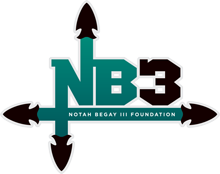The Notah Begay III (NB3) Foundation is excited to announce the release of Keeping Track: A Toolkit for Indigenous Youth Program Evaluation. The youth program focused toolkit is aimed at providing resources and information that will assist anyone involved in a youth project, program or serving at a youth-centered organization create an evaluation approach that reflects and supports their community’s needs and strengths.
In 2019, the San Manuel Band of Mission Indians awarded a grant of $167,394 to the NB3 Foundation to fund this innovative toolkit to help enhance the overall health of Native youth. The toolkit is designed to facilitate an Indigenous evaluation process that can help determine what is important to community stakeholders; what needs to be measured to satisfy stakeholders; what is feasible and appropriate to measure based on community values and norms; how to measure these items in a way that emphasizes Indigenous ways of being and knowing; and how to report, and use the evaluation findings to further promote Indigenous systems and organizational and programmatic sustainability.
From an Indigenous perspective, using this toolkit is a continuation of the knowledge handed down through generations of learning.“Evaluation has a history. What the Keeping Track Toolkit provides is a way of understanding the positive history that Indigenous communities have as evaluators. That is powerful! The Toolkit also provides a foundation of knowledge for evaluation and practical strategies for building an evaluation system that fits your specific situation,” peer reviewer of the toolkit, Director of Zuni Youth Enrichment Project, Joseph Claunch, Ph.D. said.
San Manuel Band of Mission Indians Chairman Ken Ramirez says mapping the progress of health is the key to guiding the youth into a healthier future.
“Our youth need educated advisors who know how to serve every level of their health needs,” Ramirez said. “The Tribe is proud to increase the resources given to both the youth and those serving them daily to ensure they activate every level of wellness available to them.”
In this toolkit you will find resources that range from theory to practice. Each section building upon the work NB3 Foundation has done with community partners and stakeholders. Sections include:
- What Is Evaluation – Outlines the history of Indigenous and Western evaluation and how it can be used in your community.
- Foundations – Provides an overview of the underlying fundamentals and values that guide the toolkit and Indigenous evaluation systems
- Indigenous evaluation systems – Outlines the process to develop an Indigenous evaluation system for your own organization, project or program.
- Evaluation Resources – Provides several approaches, strategies and lessons that can be used to help develop your own evaluation systems.
- References
- Glossary of Terms
To embrace new challenges and opportunities, the toolkit is designed to be an evolving resource. The NB3 Foundation will continue to build and improve upon the current version to meet the needs of Indigenous communities.







